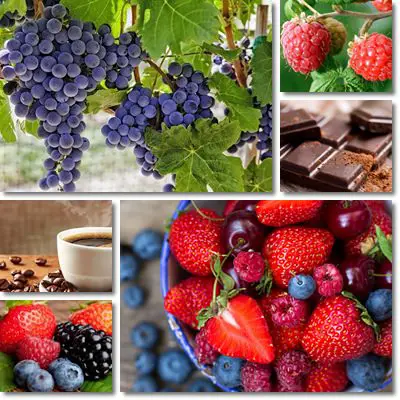Simply put, polyphenols are plant compounds with several beneficial effects on human health. Polyphenols are naturally occurring compounds that can be found in great amounts in the peel or skin of fruits and vegetables or in the thin layer between the pulp and the skin. Although they occur naturally in fruits, vegetables and their seeds, they can be extracted and added to dietary supplements or cosmetic products or produced synthetically.
The richest sources of polyphenols are dark blue, purple or black fruits such as grapes, plums, blueberries, blackberries, mirabelles, mulberries and so on. According to preliminary research, these compounds hold surprising benefits for the cardiovascular system in particular. For example, red grape juice and even high-quality wines are known to protect our veins and arteries from oxidative stress and subsequent damage. Moreover, foods rich in polyphenols are believed to block the absorption of cholesterol which can deposit on artery walls and cause their obstruction.

According to the scientific community, polyphenols may also hold surprising anti-aging benefits, keeping us looking young and beautiful. In addition to this, it has been theorized that a generous intake of such compounds with antioxidant, anti-inflammatory and even anti-proliferative effects can offer protection against chronic disease in all its forms, from obesity and cardiovascular disease to cancer and neurodegenerative disorders. The anti-aging and disease-preventing properties of these compounds are currently the object of scientific research and it is believed that polyphenols may help in the development of novelty therapies and medical treatments in the future.
According to researchers, the damage caused by reactive oxygen molecules (free radicals) at cell level, also known as oxidative stress, triggers inflammation and encourages the development of chronic disease. It would appear that our central nervous system is particularly vulnerable to the effects of oxidative stress, although ample studies suggest that there is considerable strain on our cardiovascular and immune systems as well. Polyphenols offer a certain amount of protection against oxidative stress and subsequent cell and DNA damage, reducing the risk of chronic, degenerative, proliferative diseases.
There is an incredible variety of polyphenolic compounds, each with their particular health effects. Polyphenols are generally classified by common traits and different classes hold different health effects. Tannins are a major class of polyphenols and are characterized by a particular astringency. They are commonly found in berries of all sorts (they are the reason for the particularly astringent or puckering aftertaste of cranberries or blackcurrants for example), cinnamon, teas, coffee etc. Catechins, epicatechins, flavonoids are other major types of polyphenols.

As as their properties and health effects are concerned, polyphenolic compounds have been found to hold the following benefits:
- Antimicrobial and antifungal properties.
- Strong antioxidant activity.
- Natural anti-inflammatory action.
- Anticancer potential due to their antimutagenic and antiproliferative action.
- Anti-aging effects.
- Beneficial action on blood pressure and blood lipid levels.
- Immune-boosting properties.
- Neuroprotective properties.
Their properties are not limited to one mechanism or system, but cover a broad spectrum of processes and impact the health of multiple systems, from the cardiovascular system to the nervous, digestive, respiratory and immune systems. However, it is important to choose our sources wisely because some food sources come with benefits and side effects. For example, resveratrol (a polyphenol) is great when we get it from grapes or grape juice, but wine is not an ideal source, despite concentrating generous amounts of it.
Alcohol consumption often causes more health problems than benefits. For example, alcohol can worsen gastritis, heartburn, acid reflux disease and gastric ulcers, dehydrate, raise blood pressure to unhealthy levels and encourage nutritional deficiencies that can negatively impact multiple aspects of our health. Instead of consuming alcohol to get resveratrol, you can enjoy the benefits of the polyphenol from dark-red or purple grapes, eaten with skin, pulp and seeds.
You can add blueberries, blackberries, plums, raspberries and other dark-colored fruit to your diet and enjoy a mix of healthy and delicious options. Herbal infusions, tinctures, olive oil, spices and herbs, even most vegetables are great sources of polyphenols as well. Usually, all dark-colored fruits and veggies abound in antioxidant compounds with great beneficial effects on human health. The trick is to add variety to your diet so as to ensure you get all sorts of polyphenols and enjoy their benefits.
